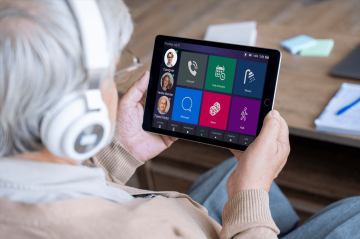What Are the Most Important Trends in Healthcare Technology?
October 12, 2022

Adequate healthcare is a crucial part of a healthy and functional society, especially as we navigate through a lingering pandemic. Healthcare professionals are developing some intriguing new technologies that could aid with pandemic relief efforts and transform the entire industry for the better. Here are four trends in healthcare technology with high potential that you should look out for.
1. Internet of medical things (IoMT)
The Internet of Things (IoT) is an ever-growing network of devices with software that enables connection with otherwise inaccessible systems across the internet. This network has found its way into the healthcare industry, providing wearable tools with artificial intelligence (AI) and machine learning capabilities.
For example, smart inhalers are IoMT’s version of the traditional asthma inhaler. Pacemakers and prosthetics with advanced sensors also fall under the IoMT umbrella. These devices can sync to a mobile app or a cloud computing system to allow for constant and accurate patient monitoring.
The widespread implementation of such devices would be more convenient and less expensive for all parties involved, simplifying medical treatment that previously required costly equipment and took days to organize. IoMT is one of the most promising trends in healthcare, as its market has grown by 28.6% since 2021.
2. Virtual and augmented reality (VR and AR)
Virtual and augmented reality aren’t just for entertainment purposes. VR is a fully simulated environment, while AR adds simulated elements to a real setting. Both can be valuable healthcare tools, assisting with surgical training and helping patients manage their health issues – both physical and mental.
The training benefits are extremely important, as hospitals across the U.S. are facing a labor shortage and need people to fill key roles. Rookie nurses and surgeons can step in and receive quick, effective training thanks to VR and AR. Veterans of the business can also polish their skills with the technology, improving procedure speeds by up to 20%.
This technology could also go a long way toward solving the world’s mental health crisis. Doctors have already started using VR and AR to create scenarios to challenge their patients during rehabilitation. For example, they can create a tense social setting to help a patient overcome social anxiety. Such revolutionary treatment has caused the market to boom, as experts expect it to grow to $37 billion by 2027.
3. Advanced cybersecurity
As the healthcare industry becomes more digital, it also becomes more vulnerable to cyber threats. We’ve already seen a spike in attacks, as healthcare breaches reached an all-time high in 2021 with over 45 million individual attacks. The implementation of advanced cybersecurity strategies is crucial for hospitals to guard against data breaches and maintain patient privacy.
Traditional methods like multi-factor authentication and frequent password changes are still viable solutions, but they only work if the staff has the training and wherewithal to use them properly. Hospitals must devote more resources to raising employee awareness as they introduce advanced tech like IoMT, VR and AR into their operations.
One advancement in cybersecurity could also make waves: biometric authentication. It has a similar concept to multi-factor authentication, except the verification process involves biological traits such as fingerprints and facial features. No matter the training or technology, cybersecurity firms should expect to see trends in healthcare clients in the near future.
4. Telehealth
Telehealth (or telemedicine) is the use of digital communication tools including desktop computers, tablets and mobile phones to organize and deliver healthcare services. The COVID-19 pandemic caused a significant drop in the number of in-person appointments, leading 41% of people to forgo medical care to avoid exposing themselves to the coronavirus.
Healthcare providers had to find alternatives for the 41%, leading them to schedule remote appointments via video conferencing. Many mobile app developers also launched health apps to help providers track the spread of the virus. These apps have continued to improve, leading to cool new features like complete EHR/EMR systems and chat rooms that allow doctors and patients to stay in touch 24/7.
McKinsey expects at least $250 billion of the United States’ healthcare spending to go towards telehealth advancement in the coming years, while studies from Fortune Insights estimate that the market will exceed $185 million by 2026. By all indications, telehealth is here to stay.
Trending towards mobilized healthcare
The above four trends in healthcare have one underlying theme: mobilization. Doctors and patients can monitor progress and talk to each other from any location thanks to IoMT and telehealth. Similarly, AR and VR allow for a more hands-on approach to training and treatment that people can complete from anywhere.
Effective cybersecurity is the piece that keeps a mobilized healthcare system together. If we want to see successful integration of these new technologies, we must also create a safe and secure digital environment where all parties can work together to determine the best treatment.
Do you need help to choose the right digital care software?
Or do you have any questions related to digital care?
Contact us and we will gladly help you.

Shannon Flynn - Managing Editor at ReHack
With over 5 years of writing and editing experience, Shannon focusses on covering topics like medical, health, and lifestyle technology.
Keep reading:
Aging in the AI Age: How Technology is Redefining Senior Care
Discover how technology is transforming senior care in the AI Age. From remote health check-ins to cognitive stimulation and combating loneliness, this article explores how Oscar Senior helps care organizations deliver smarter, more connected, and compassionate care — with tools that are simple, accessible, and ready to use.
Oscar Senior + CogniEnhance
Oscar Senior has announced a new partnership with CogniEnhance, a leading cognitive stimulation platform. This collaboration brings personalized brain training into Oscar Senior’s digital care environment, helping organizations improve mental wellbeing, engagement, and independence among older adults — all within a seamless remote care experience.
Press Release: Oscar Senior Secures 1 Million USD in Funding for Oscar Family App and Tablet Bundle
Oscar Senior, a leading digital solutions provider focused on enhancing the lives of seniors and individuals with disabilities, proudly announces a significant financial milestone concurrent with the launch of Oscar Family. In a successful funding round, the company secured 1 million USD to support the innovative Oscar Family app bundled with a Samsung tablet.



